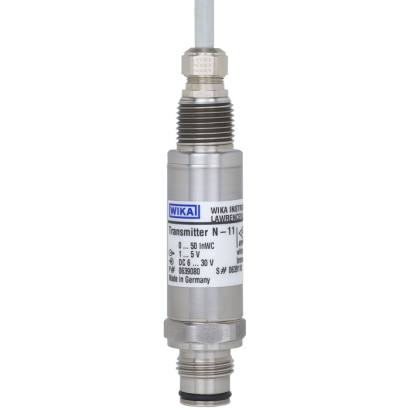 WIKA’s pioneering pressure transmitters are changing the game in gas clean-up, revolutionizing the path to carbon-neutral energy production. Discover how these innovations are driving sustainability in a challenging industry.
WIKA’s pioneering pressure transmitters are changing the game in gas clean-up, revolutionizing the path to carbon-neutral energy production. Discover how these innovations are driving sustainability in a challenging industry.
The winds of change are blowing towards a carbon neutral future. With more and more companies joining the bandwagon of sustainability in their journey towards net zero, it is imperative for companies to transform their plant operations and align with clean technology measures.
A Canada-based clean technology company works in the area of building customized biogas clean-up systems and aids wastewater treatment plants, landfills, agricultural digesters, and power generation facilities in turning waste biogas into clean, renewable natural energy. The company recently took on a mammoth task with oil and gas producers to convert shale and associated gas into hydrogen and natural gas.
They used the C3P process to remove contaminants from biogas and other gases to parts-per-billion (ppbv) levels and convert them into renewable heat, electricity, biomethane, biodiesel, hydrogen, and carbon-neutral CO2 for greenhouses and hydroponics.
All went well, until the company hit a roadblock.
Challenges On The Way
In the removal and conversion of contaminants, measuring and controlling methane gas in the process skid is a major challenge that most companies encounter. The situation here was no different.
The challenge was addressed by WIKA, a global market leader in pressure and temperature measurement technology. Understanding the herculean complication at hand, WIKA suggested approaching the problem using its uniquely modeled pressure transmitters.
Gas clean-up in oil and gas companies usually comprises four steps to remove biogas contaminants. The steps include:
● Condensation: The feed is initially cooled to condense water and other contaminants, such as siloxanes and volatile organic compounds (VOC). Condensed liquids are then separated from the gas stream to remove a large proportion of the contaminants without using any adsorbent media.
● Conversion: Following the primary step, the dry feed gas released is treated with a hydrogen-assisted catalytic process that converts the broad spectrum of problematic organic contaminants into a known and easily captured set of species.
● Capture: Specially formulated sorbent media beds, specifically tailored to the known species produced by the conversion stage, capture the remaining contaminants. This ensures the absolute capture of any remnants that might be left out.
● Polishing: Biogas is then further polished of trace-level contaminants to the parts-per-billion level in a final chemisorption step. This unique polishing step provides reliable protection of downstream equipment, even in the event of spikes in the input gas contaminant levels.
However, measuring and controlling the methane gas in the process skid becomes a crucial element in determining the success of the entire process. The Canadian clean technology company wanted a one-off solution that could effectively sync into the entire process and support the technology, making carbon capture and conversion as seamless as possible.
Propelling a Reliable Solution
Addressing the situation, WIKA presented a customized pressure monitoring system specially designed for the methane plant. The non-incendive pressure transmitters, devised by the German instrumentation major, are specifically designed to meet the durability and performance requirements of gas compressor systems. To achieve optimal results, WIKA incorporated the pressure transmitters with unique features, including an industry standard 4-20 mA 2 wire signal output, NEMA 4X (IP 67) weather protection, and high resistance to pressure spikes, vibration, and moisture intrusion. The pressure transmitters with NACE MR-01-75 compliance provide extra resistance against sulfide stress cracking when exposed to gases containing sulfur.
The pressure transmitters can be effectively integrated into Biogas Upgrading Systems to remove contaminants and inert gas from biogas, which can be further upgraded as biomethane for gas pipeline injection or vehicle fuel. They can also be optimally used in natural gas compressors, wellhead monitoring, pipeline pressure, and various other general industrial applications. The pressure transmitters come with FM and CSA approval. WIKA also provides round-the-clock technical support for optimal performance of the devices.
Equipped with this world-class innovation, the Canadian company was able to effortlessly cater to its customers and remove contaminants to unmatched parts-per-billion (ppbv) levels, aiding them in their journey towards carbon neutrality.
Epitome of Excellence
WIKA, equipped with its unmatched innovation and research, caters to every problem in the industry by offering unique solutions that can help companies meet their parameters. True to its motto, ‘Smart in Sensing’, WIKA solutions are devised to transform businesses and offer quality, reliability, and consistency in every operation.
For more information: www.wika.com